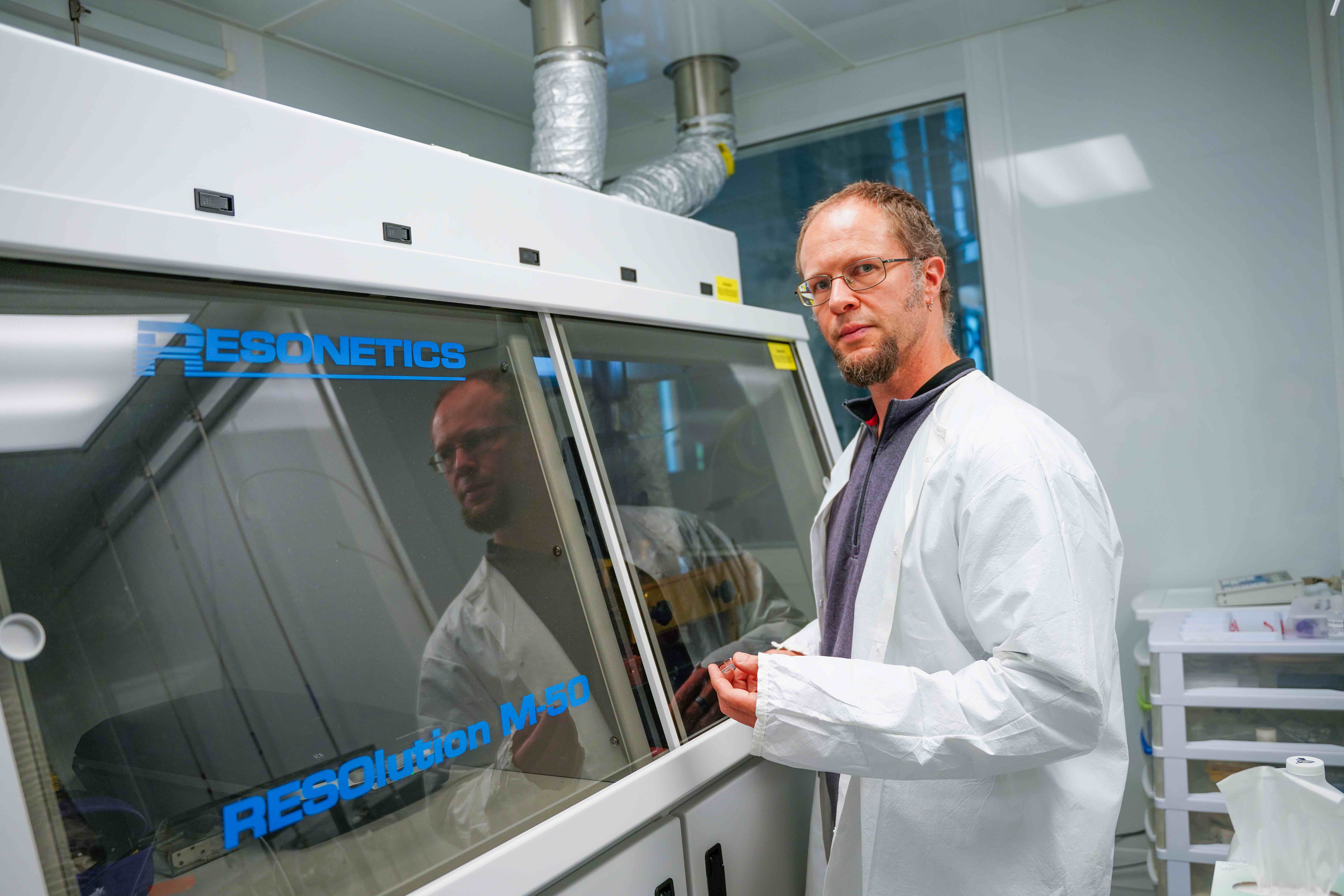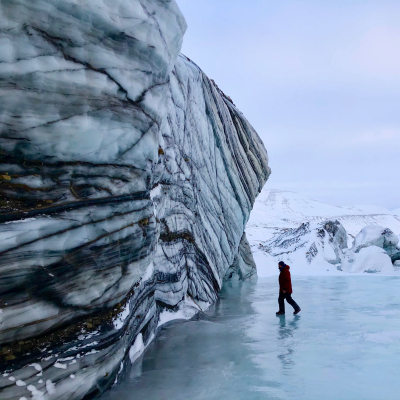News
Stay up-to-date with what's happening in EOAS
Glacier media and EOAS team up to launch new forecasting service, Weatherhood
Nicolas Duboc, an Earth Oceans and Atmospheric Science graduate student in Roland Stull’s laboratory, and research assistant Kat Pexa are preparing to launch WeatherHood in collaboration with Glacier Media this summer. This free weather forecasting service uses a novel network of weather sensors stationed around metro Vancouver to provide real-time data, making it the first hyperlocal weather forecasting service of its kind in North America. Scroll down to watch our interview with Nicolas and Kat!
Since the project began in June 2022, the team has installed 60 weather stations across a variety of urban, forested, and mountainous regions. The hyperlocal aspect of this solution will allow researchers like Dr. Roland Stull, who directs the Weather Forecast Research Team, and their students to track differences between microclimates within Vancouver’s variable landscapes. In turn, these results will enable scientists to study the effects of land-use and local geography on weather and climate.
Now that WeatherHood has launched, users can track current conditions, hourly, multi-hour, and 7-day forecasts specific to their location within the Weatherhood network, spanning north to south from Whistler to Tsawassen and east to west from Chilliwack to Sechelt. This immediately accessible data will aid the city in forecasting hazards, managing transportation and recreational services, and making decisions regarding infrastructure installation projects.
While WeatherHood enables easy weather-tracking for Vancouverites, installing the weather stations for the forecasting service was no easy task. Since June, the Weatherhood team has been busy setting up weather stations throughout the city. Nicolas and Kat shared stories of scaling the roofs and summits of some of Vancouver’s most iconic sites, often with heavy backpacks full of equipment, to deploy weather stations. One of their most memorable jobs included a trip to the Vancouver Art Gallery where they were ushered through back doors, among fine art, to set-up a suite of sensors on the roof.
Methane release from retreating glaciers in the Arctic
On a trip to Norway to give a presentation on microbial production of methane (methanogenesis), Dr. Sasha Turchyn of the University of Cambridge was met with questions from local scientists about methane recently discovered in glacial fed groundwater springs. Curiosity surrounding this new methane source led to a coalition of scientists, including UBC Earth Oceans and Atmospheric Sciences Assistant professor Hal Bradbury, seeking to uncover the mechanism of this novel kind of methane release, the original methane source, and the scale of methane emissions from glacial groundwater springs. The group’s findings were published last week in Nature Geoscience in an article titled ‘Groundwater springs formed during glacial retreat are a large source of methane in the high Arctic’.
The fieldwork led by Gabrielle Kleber included groundwater sampling from 78 terrestrial glaciers on Svalbard over three years. The research revealed methane previously trapped under glaciers or permafrost is seeping out of the ground as glaciers retreat faster than permafrost can expand, leaving a gap in the ice cap through which methane can escape. The glacial meltwater forms the groundwater springs that carry methane out from under the glaciers. These methane emissions, equivalent to ~8% of Norway’s anthropogenic oil and gas emissions, primarily come from thermogenic reactions taking place over thousands of years in organic-carbon rich bedrock underlying the glaciers, rather than from a more recent biological source. These are the same kind of rock formations valued for their oil and gas reserves.
Unfortunately, emissions of this kind are likely to increase as the process forms a positive feedback loop, prompting further glacial retreat. Glaciers that run into the ocean, known as marine-terminating glaciers, make up most of the glaciers in the high arctic and do not currently contribute to methane emissions from groundwater springs. However, in the coming years as these glaciers retreat inland, they may also become an important source of methane. The article concludes by urging climate experts to consider these kinds of feedback mechanisms, which are likely present in other parts of the Arctic besides Svalbard. Such unaccounted for feedback loops are likely to blame for the rapid rate of Arctic warming that is far exceeding model predictions.
Due to the high impact nature of this research, it has already gathered much attention from the scientific community and beyond. Many news outlets including the Washington Post, Vancouver Sun, Insider, and even Men’s Journal have posted articles highlighting the recent publication.
Are viruses keeping sea lice at bay in wild salmon?
Read the UBC Science article: Are viruses keeping sea lice at bay in wild salmon?
More than 30 previously unknown RNA viruses have been identified in sea lice, parasitic copepods (small crustaceans) that have been implicated in the decline of wild salmon populations and causing problems to the fish aquaculture industry worldwide.
This research, recently published in PLOS Pathogens, was carried out by Dr. Tianyi Chang, Dr. Brian Hunt, Dr. Curtis Suttle from the Department of Earth, Ocean and Atmospheric Sciences, University of British Columbia and Dr. Junya Hirai from the Atmosphere and Ocean Research Institute, University of Tokyo.
The researchers obtained and analyzed RNA data from sea lice removed from out-migrating juvenile salmon collected in the waters surrounding the Discovery Islands and Broughton Archipelago on the northeastern side of Vancouver Island, as well as from farmed salmon in Chile.
The paper sheds greater light on the types of viruses being carried by sea lice, and how the viruses and host are interacting. “We found many more types of viruses than are known in sea lice or their distant relatives; the lice are mounting an immune defense response to many of these viruses indicating that they are replicating,” says Dr. Curtis Suttle, senior author of the paper. “In a natural system, viruses may prevent explosions in sea-lice populations by rapidly replicating when densities become high.”
Read/Listen to the Cortes Currents interview with Dr. Curtis Suttle: The viruses infecting sea lice
Read the paper: Divergent RNA viruses infecting sea lice, major ectoparasites of fish
Meet Doriane Drolet - Seismologist
Dorian is a PhD student in geophysics in the seismology field. She is developing a novel automatic numerical approach to recover the rupture mechanisms of small earthquakes. The identification of rupture mechanisms of a large number of earthquakes is then used to identify potential hazardous faults and gain a better understanding of the forces governing the tectonic plates.
UBC EOAS students wade in to Lost Lagoon’s water woes
Read the UBC Science article by Geoff Gilliard: UBC students wade into Lost Lagoon’s water woes.
After carp die-offs in Vancouver’s Lost Lagoon the past two summers, UBC EOAS students went out to test the human-made lake’s murky waters.
A team from UBC’s Community Projects in Environmental Science, Logan Hwang, Samantha Kortekaas, Yinzhi Li and Annabel Tse, were recruited to assess Lost Lagoon’s water quality by Dacyn Holinda, the Stanley Park Ecology Society’s (SPES) conservation projects manager and Dr. Tara Ivanochko, UBC EOAS professor and co-instructor of UBC’s Community Projects in Environmental Science.

Left to right: UBC students Yinzhi Li, Annabel Tse, Dacyn Holinda, Logan Hwang and Samantha Kortekaas.
The students provided the project scoping, fieldwork, research and analysis. Samples from the biofiltration ponds and the lagoon would be tested for metal and hydrocarbons based on B.C. Ministry of Environment Water Quality Guidelines. Their results showed high concentrations of aluminum, tin and chromium in the water samples, suggesting that the ponds don’t appear to be filtering these three metals effectively, and that the sediments may be saturated with these metals due to lack of maintenance. Concentrations of phosphorus — which causes eutrophication and phytoplankton blooms — exceeded the guidelines at all sites. The good news is that the levels of copper, zinc and cadmium were within safe limits and that hydrocarbons (gas and oil) and 6PPD-quinone (from tire particles) were also found to be below levels deemed to be harmful.
The students recommend taking measurements of pollutant concentrations in the sediments of the ponds, and that dredging sediments more frequently would decrease toxicity in Lost Lagoon. They also suggested that after dredging, more tests on metals and nutrients should be conducted in December 2023 and February 2024.
“The results from this project are a great start,” Holinda says. “From here, we can start to narrow in on the sources of contamination, with the ultimate goal of finding solutions which the Park Board can implement to improve the health of the lagoon and surrounding area.”
Read the UBC Science article by Geoff Gilliard: UBC students wade into Lost Lagoon’s water woes | Focus
Watch the video from UBC Science: https://www.youtube.com/watch?v=tekgZpxmp6M
Read the full report: Water Quality Analysis of Lost Lagoon and Associated Biofiltration Ponds at Stanley Park.
New research led by Dr. Joel Saylor describes formation of unique Central Andean Plateau
The Central Andean Plateau is unlike any other place in the world. It is the largest plateau of its kind on Earth, sitting over 3 km in elevation. This unique formation has presented many mysteries to geologists attempting to explain how the plateau formed.
In his recent article, published in Earth and Planetary Science Letters, EOAS Associate Professor Joel Saylor and his coauthors propose a new model to describe the formation of the Central Andean Plateau. Scroll down to watch our interview with Dr. Joel Saylor. To study the plateau, Dr. Joel Saylor and his team collected rock samples from different rock layers within the region. Here, at the University of British Columbia, the rocks were crushed and processed to isolate minerals known as zircon. The zircon was then analyzed at the Pacific Center for Isotopic and Geological Research within the Earth, Oceans, and Atmospheric Science department. The isotopic analysis allowed the team to determine the age of the rocks and therefore the ages of the different layers they had sampled. With these insights, they were able to put together a picture of how the Central Andean Plateau may have formed through shallow, flat slab subduction.

Dr. Joel Saylor in the PCIGR lab displaying a zircon sample. credit: Junyi Sun
Head to Earth and Planetary Science Letters to read the full article titled, ‘Basin formation, magmatism, and exhumation document southward migrating flat-slab subduction in the central Andes’.





